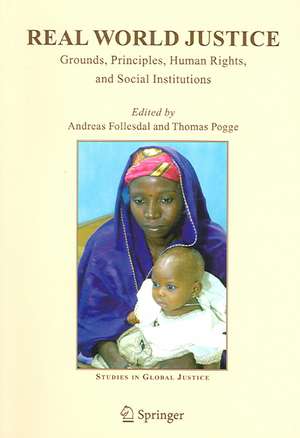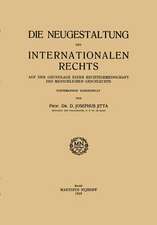Real World Justice: Grounds, Principles, Human Rights, and Social Institutions: Studies in Global Justice, cartea 1
Editat de A. Follesdal, T. Poggeen Limba Engleză Paperback – 8 iun 2005
| Toate formatele și edițiile | Preț | Express |
|---|---|---|
| Paperback (1) | 1222.49 lei 6-8 săpt. | |
| SPRINGER NETHERLANDS – 8 iun 2005 | 1222.49 lei 6-8 săpt. | |
| Hardback (1) | 1228.62 lei 6-8 săpt. | |
| SPRINGER NETHERLANDS – 8 iun 2005 | 1228.62 lei 6-8 săpt. |
Din seria Studies in Global Justice
-
 Preț: 212.66 lei
Preț: 212.66 lei - 18%
 Preț: 942.44 lei
Preț: 942.44 lei - 15%
 Preț: 639.73 lei
Preț: 639.73 lei - 15%
 Preț: 636.80 lei
Preț: 636.80 lei - 18%
 Preț: 892.74 lei
Preț: 892.74 lei -
 Preț: 354.54 lei
Preț: 354.54 lei - 15%
 Preț: 648.24 lei
Preț: 648.24 lei -
 Preț: 446.47 lei
Preț: 446.47 lei - 15%
 Preț: 641.71 lei
Preț: 641.71 lei - 18%
 Preț: 731.91 lei
Preț: 731.91 lei - 15%
 Preț: 587.72 lei
Preț: 587.72 lei - 18%
 Preț: 945.47 lei
Preț: 945.47 lei - 24%
 Preț: 626.04 lei
Preț: 626.04 lei - 18%
 Preț: 892.28 lei
Preț: 892.28 lei - 18%
 Preț: 948.92 lei
Preț: 948.92 lei - 15%
 Preț: 641.03 lei
Preț: 641.03 lei - 15%
 Preț: 637.13 lei
Preț: 637.13 lei - 15%
 Preț: 638.57 lei
Preț: 638.57 lei - 15%
 Preț: 635.96 lei
Preț: 635.96 lei - 18%
 Preț: 947.50 lei
Preț: 947.50 lei - 15%
 Preț: 639.25 lei
Preț: 639.25 lei
Preț: 1222.49 lei
Preț vechi: 1490.84 lei
-18% Nou
Puncte Express: 1834
Preț estimativ în valută:
233.95€ • 254.04$ • 196.52£
233.95€ • 254.04$ • 196.52£
Carte tipărită la comandă
Livrare economică 22 aprilie-06 mai
Preluare comenzi: 021 569.72.76
Specificații
ISBN-13: 9781402031496
ISBN-10: 1402031491
Pagini: 414
Ilustrații: VI, 408 p.
Dimensiuni: 155 x 235 x 22 mm
Greutate: 0.58 kg
Ediția:2005
Editura: SPRINGER NETHERLANDS
Colecția Springer
Seria Studies in Global Justice
Locul publicării:Dordrecht, Netherlands
ISBN-10: 1402031491
Pagini: 414
Ilustrații: VI, 408 p.
Dimensiuni: 155 x 235 x 22 mm
Greutate: 0.58 kg
Ediția:2005
Editura: SPRINGER NETHERLANDS
Colecția Springer
Seria Studies in Global Justice
Locul publicării:Dordrecht, Netherlands
Public țintă
ResearchCuprins
Poverty and Global Justice: Some Challenges Ahead.- Justice, Morality and Power in the Global Context.- “Saving Amina”: Global Justice for Women and Intercultural Dialogue.- Poverty as a Human Rights Violation and the Limits of Nationalism.- International or Global Justice? Evaluating the Cosmopolitan Approach.- Understanding and Evaluating the Contribution Principle.- World Poverty and Moral Responsibility.- The Principle of Subsidiarity.- “It's the Power, Stupid!” On the Unmentioned Precondition of Social Justice.- Egalitarian Global Distributive Justice or Minimal Standard? Pogge's Position.- Responsibility and International Distributive Justice.- From Natural Law to Human Rights — Some Reflections on Thomas Pogge and Global Justice.- Deliberation or Negotiation? Remarks on the Justice of Global and Regional Human Rights Agreements.- Human Rights and Relativism.- The Nature of Human Rights.- Severe Poverty as a Human Rights Violation — Weak and Strong.- The First UN Millennium Development Goal: A Cause for Celebration?.- Can Global Distributive Justice be Minimalist and Consensual? — Reflections on Thomas Pogge's Global Tax on Natural Resources.- Redistributing Responsibilities — The UN Global Compact with Corporations.
Textul de pe ultima copertă
The concept of global justice makes visible how we citizens of affluent countries are potentially implicated in the horrors so many must endure in the so-called less developed countries.
Distinct conceptions of global justice differ in their specific criteria of global justice. However, they agree that the touchstone is how well our global institutional order is doing, compared to its feasible alternatives, in regard to the fundamental human interests that matter from a moral point of view.
We are responsible for global regimes such as the global trading system and the rules governing military interventions. These institutional arrangements affect human beings worldwide, for instance by shaping the options and incentives of governments and corporations. Alternative paths of globalization would have differed in how much violence, oppression, and extreme poverty they engender. And global institutional reforms could greatly enhance human rights fullfillment in the future.
The importance of this global justice approach reaches well beyond philosophy. It enables ordinary citizens to understand their options and responsibility for global institutional factors, and it challenges social scientists to address the causes of poverty and hunger that act across borders.
The present volume addresses four main topics regarding global justice: The normative grounds for claims regarding the global institutional order, the substantive normative principles for a legitimate global order, the roles of legal human rights standards, and some institutional arrangements that may make the present world order less unjust.
All royalties from this book have been assigned to Oxfam.
Distinct conceptions of global justice differ in their specific criteria of global justice. However, they agree that the touchstone is how well our global institutional order is doing, compared to its feasible alternatives, in regard to the fundamental human interests that matter from a moral point of view.
We are responsible for global regimes such as the global trading system and the rules governing military interventions. These institutional arrangements affect human beings worldwide, for instance by shaping the options and incentives of governments and corporations. Alternative paths of globalization would have differed in how much violence, oppression, and extreme poverty they engender. And global institutional reforms could greatly enhance human rights fullfillment in the future.
The importance of this global justice approach reaches well beyond philosophy. It enables ordinary citizens to understand their options and responsibility for global institutional factors, and it challenges social scientists to address the causes of poverty and hunger that act across borders.
The present volume addresses four main topics regarding global justice: The normative grounds for claims regarding the global institutional order, the substantive normative principles for a legitimate global order, the roles of legal human rights standards, and some institutional arrangements that may make the present world order less unjust.
All royalties from this book have been assigned to Oxfam.
Caracteristici
Contains essays by leading experts in the fields of philosophy, economics, law, and political science Offers a wide range of perspectives because of its highly international composition (authors from 11 countries on 4 continents) Emphasizes on connecting ethical-philosophical discussions with concrete political issues of institutional design
















